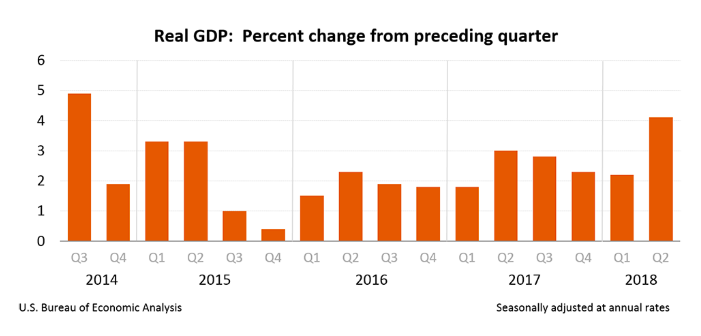Real gross domestic product increased at an annual rate of 4.1% as consumer spending championed the economy, according to the advance estimate released by the U.S. Bureau of Economic Analysis.
This jump marks the fastest increase in GDP growth since the third quarter of 2014, making President Donald Trump's campaign promise a reality.
Today's second quarter advance GDP estimate is based on incomplete source data and is subject to further revision, which will be released on August
“Consumers once again carried the heaviest load in the economy, with their spending accounting for the lion's share of the 4.1% growth in the second quarter.” Navy Federal Credit Union Corporate Economist Robert Frick said. “Even backing out the boosts from tax reform and government spending, which would drop GDP below 4% and likely to around 3.7% to 3.8%, this was an excellent quarter.”
Frick says that the economy is a “Goldilocks zone” meaning the Fed will have no reason to raise rates faster and cool off the economy.
“The keys now to keep GDP finishing out the year above 3.5% will be continued good consumer spending, but also a lift in business capital expenditures,” Frick said. “That type of investment will help increase productivity, boost manufacturing and let the 30% of the economy that is not consumer spending start pulling its weight.”
Although GDP has climbed, Frick says that wage growth will continue to burden consumers.
“Real wage growth hit zero this summer, meaning, on average, Americans are not seeing a boost in their paychecks,” Frick continued. “This is highly unusual this late in an economic expansion. For consumers to keep contributing to growth, real wages will have to increase.”
The chart below shows this climb brings GDP up two percentage points from the first quarter, as well as more than one percentage point from the second quarter of 2017.

(Source: BEA)
Real gross domestic income increased 4.1% in the second quarter, up from an increase of 2.2% in the first quarter. The average of real GDP and real GDI, a supplemental measure of U.S. economic activity that equally weights GDP and GDI, increased 2.1% in the second quarter, remaining unchanged from the first quarter.
The increase in real GDP in the second quarter reflected positive contributions from personal consumption expenditures, exports, nonresidential fixed investment, federal government spending, and state and local government spending.
These were partly offset by negative contributions from private inventory investment and residential fixed investment.
An update to the first quarter's GDP released by BEA shows that first quarter real GDP was 0.2 percentage points from the first estimate, which reflects upward revisions to private inventory investment, nonresidential fixed investment, and federal government spending that were partly offset by downward revisions to PCE and residential fixed investment.
Here are updates to the previous estimate:
Real GDP: Increased to 2.2%, up from last estimate’s 2%
Current-dollar GDP: Increased to 4.3%, up from last estimate’s 4.2%
Real GDI: Increased to 3.9%, up from last estimate’s 3.6%
Average of Real GDP and Real GDI: Increased to 3.1%, up from 2.8%
Gross domestic purchases price index: Decreased to 2.5%, down from last estimate’s 2.7%
Personal consumption expenditures: Remained unchanged at 2.5%





